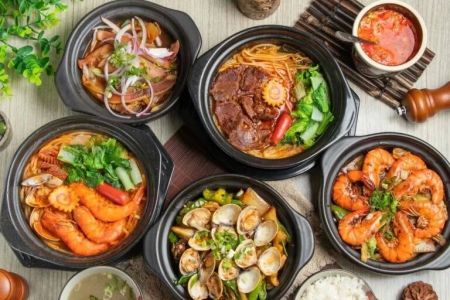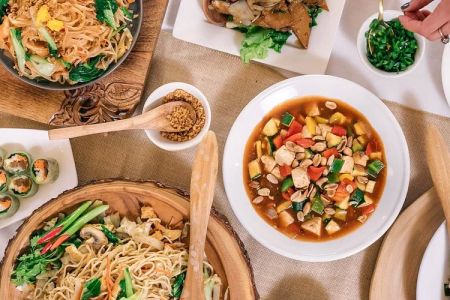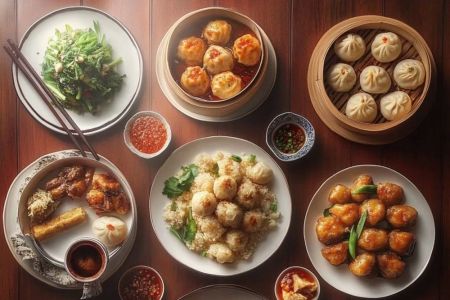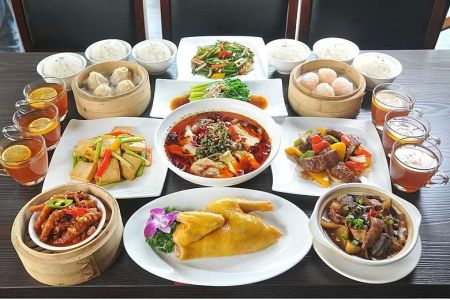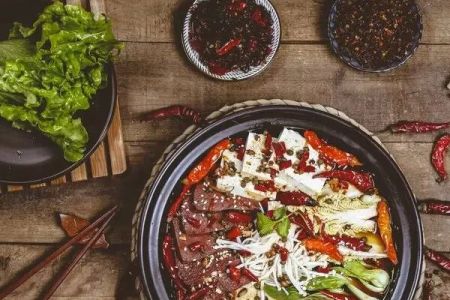How to Make Chinese Food with Better Nutritional Balance: A Practical Guide
As someone who loves the flavors and textures of Chinese food, I've always been fascinated by how rich and diverse this cuisine is. The colors, spices, and layers of taste are something that captures the attention of anyone who tries it. But over time, I began to wonder – how can we enjoy Chinese food while maintaining a better nutritional balance? Today, I want to share with you a few tips, tricks, and personal insights that I’ve discovered through experience. Let’s dive into how we can make Chinese food healthier without compromising the bold and delightful flavors that make it so special.
1. Focus on Fresh, Whole Ingredients
In my early attempts to recreate Chinese food at home, I often resorted to processed or pre-packaged ingredients for convenience. But I soon realized that these shortcuts led to dishes that lacked the freshness and nutritional value of traditional recipes. Fresh vegetables, lean proteins, and whole grains should be your go-to ingredients.
Chinese cuisine is built around fresh produce, and it’s easy to adapt most recipes by incorporating vibrant vegetables like broccoli, bell peppers, and bok choy. Using fresh ginger, garlic, and herbs not only enhances the flavor but also adds nutrients that are vital to overall health. For proteins, choose skinless chicken, tofu, or fish over fattier cuts of meat. And don’t forget to make use of whole grains like brown rice or quinoa instead of white rice to boost fiber intake.
2. Use Healthier Cooking Methods
One of the things that I’ve learned is that the way we cook can make a big difference in the nutritional value of a dish. Traditional Chinese cooking methods like stir-frying, steaming, and braising are not only quick but also help retain the vitamins and minerals in the food. They also use less oil compared to deep-frying, which is common in some Chinese restaurants.
Stir-frying is an excellent technique for maintaining the crispness and flavor of vegetables while keeping their nutritional value intact. Steaming, on the other hand, is a great way to prepare dumplings, fish, and vegetables, and it doesn’t require much oil. Braising is perfect for tenderizing meats like pork or chicken while infusing them with rich flavors from broths and herbs.
3. Adjust the Sauces and Seasonings
Chinese cuisine is known for its complex, savory sauces, but they can often be high in sugar, sodium, and unhealthy fats. One of the easiest ways to make your Chinese food healthier is to modify the sauces and seasonings. For instance, soy sauce is a staple in many Chinese dishes, but it can be very high in sodium.
In my kitchen, I’ve switched to low-sodium soy sauce or tamari, which still offers that deep umami flavor but with much less salt. I’ve also learned to make my own stir-fry sauces using healthier ingredients like homemade stock, rice vinegar, a dash of sesame oil, and a little honey for sweetness. This way, you get the flavor without the unnecessary additives.
4. Control Portion Sizes
Chinese food is often served in large portions, which makes it easy to overeat. One of the habits I’ve developed is to divide the food into smaller portions to prevent overeating. In many Chinese restaurants, dishes are meant to be shared, which makes portion control a bit easier. When cooking at home, I make sure to use smaller plates or bowls to help regulate serving sizes.
Additionally, if you're enjoying a feast with family or friends, consider serving a larger variety of dishes, but in smaller quantities. That way, you get to enjoy different flavors without overindulging in one specific item. This strategy not only promotes healthier eating but also gives you the opportunity to savor a greater variety of foods.
5. Add More Plant-Based Ingredients
Over the years, I’ve become more conscious of adding more plant-based foods to my meals. Chinese cuisine is incredibly versatile when it comes to vegetables, tofu, and legumes. Instead of relying solely on meat, I try to include a variety of plant-based proteins such as tofu, edamame, and chickpeas in my dishes.
Adding more vegetables not only boosts the nutritional value but also creates a more colorful and satisfying meal. Dishes like stir-fried tofu with mixed vegetables or vegetarian dumplings are not only packed with nutrients but also lower in calories, making them a great choice for anyone looking to maintain a balanced diet.
6. Be Mindful of Sugar and MSG
One thing I’ve always loved about Chinese cuisine is the balance of sweet, salty, and savory flavors. However, many Chinese dishes, especially those found in restaurants, can be laden with sugar and MSG to enhance flavor. I’ve learned to be mindful of this when preparing meals at home. I use natural sweeteners like honey or maple syrup instead of refined sugars, and I avoid MSG by using fresh ingredients to develop the depth of flavor.
Even in dishes like General Tso’s chicken or sweet and sour pork, I make healthier versions by using alternative sweeteners and cutting down on the sauce’s sugar content. These adjustments allow me to enjoy the sweetness without the sugar crash later on.
7. Experiment with Fusion Recipes
Sometimes, the best way to make Chinese food more balanced is to experiment with fusion recipes. I love blending traditional Chinese techniques with more Western ingredients. For instance, I’ve made a delicious stir-fry using quinoa instead of rice or a vegetable-packed egg roll with a whole-wheat wrapper. These small adjustments can elevate the nutritional profile of classic Chinese dishes while still maintaining their beloved flavors.
Don’t be afraid to experiment in the kitchen. Sometimes, the most creative and healthy versions of your favorite dishes come from a little culinary experimentation. It’s a fun way to explore new tastes while sticking to a balanced diet.
8. Balance Your Meal with Sides and Soups
Chinese meals are often accompanied by soup, and this is an easy way to add more nutrients without overloading on calories. Instead of rich, creamy soups, try making lighter broths with ingredients like mushrooms, tofu, seaweed, and vegetables. A simple miso soup or a hot-and-sour soup can complement your main dishes and keep the meal light and nutritious.
Pair your main entrée with healthy sides like sautéed greens, a light vegetable stir-fry, or a refreshing cucumber salad. These sides provide extra fiber and nutrients, helping to round out your meal and keep you feeling full and satisfied without overeating.
By focusing on fresh ingredients, healthier cooking methods, and mindful seasoning, Chinese food can be both delicious and nutritious. Whether you’re trying to make a healthier version of your favorite restaurant dish or experimenting with new recipes in the kitchen, there are countless ways to enjoy the rich flavors of Chinese cuisine without sacrificing your health. I hope these tips help you create more balanced, nutritious meals that you and your loved ones will enjoy.



